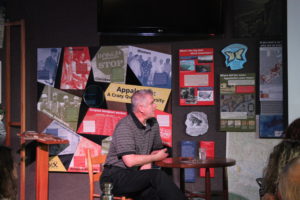Reclaiming Appalachia: Photography and Woodwork by Dr. Alan Mills
Reclaiming Appalachia: Photography and Woodwork by Dr. Alan Mills
 The Appalachian Center Gallery was packed with people enjoying Panera sandwiches on Thursday, February 26th, for the Dinner on the Grounds with Dr. Alan Mills. Mills is a photographer, professor, and woodworker who is invested in preserving Appalachian history through photography and reclamation.
Mills kicked off his presentation by sharing some of his photography in Appalachia and beyond. My favorites were his pictures focusing on his recent interest in old wooden barns in Appalachia. I have always been drawn to these old barns and to the stories built into the structure. Who built the barn? What kind of animals lived there? What is the story of the family who lived on the farm? All of these questions come to mind when I see these barns, and Mills captures them beautifully.
These photographs are not only a glimpse into Appalachian history, but they also begin to envision Alan Mills’ other interest, reclaiming wood from old structures and turning them into beautiful furniture. Sadly, many of these beautiful barns stand in disrepair because they require a lot of upkeep to maintain. Mills shared pictures of desks and tables he has made from the old reclaimed barn wood. He, in his own way, is preserving these historical structures. I think if he can manage to pass along stories along with wood, he will be doing Appalachian history a service.
Mills wrapped up his presentation by inviting all of us in the audience to come
The Appalachian Center Gallery was packed with people enjoying Panera sandwiches on Thursday, February 26th, for the Dinner on the Grounds with Dr. Alan Mills. Mills is a photographer, professor, and woodworker who is invested in preserving Appalachian history through photography and reclamation.
Mills kicked off his presentation by sharing some of his photography in Appalachia and beyond. My favorites were his pictures focusing on his recent interest in old wooden barns in Appalachia. I have always been drawn to these old barns and to the stories built into the structure. Who built the barn? What kind of animals lived there? What is the story of the family who lived on the farm? All of these questions come to mind when I see these barns, and Mills captures them beautifully.
These photographs are not only a glimpse into Appalachian history, but they also begin to envision Alan Mills’ other interest, reclaiming wood from old structures and turning them into beautiful furniture. Sadly, many of these beautiful barns stand in disrepair because they require a lot of upkeep to maintain. Mills shared pictures of desks and tables he has made from the old reclaimed barn wood. He, in his own way, is preserving these historical structures. I think if he can manage to pass along stories along with wood, he will be doing Appalachian history a service.
Mills wrapped up his presentation by inviting all of us in the audience to come  lay our hands on pieces of history. He had chunks of wood from various locations on Berea College’s campus. All of these were from structures that have long since been replaced. As a student, it was awe-inspiring to be able to lay hands on a piece of the legacy of my school. I enjoyed seeing the creative ways in which Mills is working to reclaim Appalachia slat by slat of wooden building, of track, of barn. His work shows that reclamation can be an exciting and innovative way to preserve history and that it may not be what most people would think of when they hear the word.
Article Written by Emily Masters
lay our hands on pieces of history. He had chunks of wood from various locations on Berea College’s campus. All of these were from structures that have long since been replaced. As a student, it was awe-inspiring to be able to lay hands on a piece of the legacy of my school. I enjoyed seeing the creative ways in which Mills is working to reclaim Appalachia slat by slat of wooden building, of track, of barn. His work shows that reclamation can be an exciting and innovative way to preserve history and that it may not be what most people would think of when they hear the word.
Article Written by Emily Masters